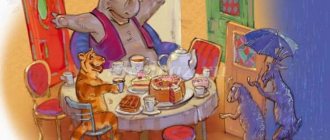We walk and talk
You can develop the speech of younger preschoolers on walks. Such “activities” are very natural, bring children a lot of impressions, and contribute to their knowledge of the world. While walking, the baby will begin to ask a lot of questions, many of which encourage the thought process and require the expression of emotions and thoughts using words. And all parents can do is communicate with the child, expanding his vocabulary, enriching his knowledge. This is how the child learns new words and concepts that will soon become mandatory in his everyday speech. Don't be afraid that the baby won't understand you. During these valuable moments of communication, the baby listens and learns to perceive his native speech.
“Did you know that walking is one of the most effective ways to develop a child’s speech? All that remains is to organize it correctly.”
During the walk we recommend:
- describe everything that surrounds you
- keep your baby interested in what is happening around him
- use different parts of speech to name objects, their signs and actions
- speak emotionally and intonation richly, in a calm tone.
Environment for speech development
For successful speech development of a child, it is necessary to create conditions that would contribute to the formation of good speech skills. Such conditions can be created both in a preschool institution and in the family. The developmental environment will provide different types of activity for the younger preschooler (speech, mental, physical and play) and will successfully form his independent speech activity.
So, what needs to be done to create a cozy environment at home, rich in a variety of educational gaming and educational materials?
- At home, conditions must be created for the baby’s independent activity - for play, cognition, movement, imagery.
- Items in the child’s room should be suitable for the baby’s age and correspond to his interests and needs.
- At home, communication between the child and adults should be organized.
- Parents should help organize the child’s contacts with peers.
- Mom and dad should offer the child books, pictures, toys, and objects for independent study in order to deepen knowledge about the world around them.
- You can organize a “corner” of interesting things with didactic materials that encourage speech activity.
- Parents should not only actively communicate with the child, naming all actions, but also read and study in the direction of speech development.
Thus, a well-prepared developmental environment will contribute to the formation of speech skills of younger preschoolers and will ensure their independent natural speech development.
Educational didactic games
At the age when the child gradually moves from babbling to words (1.5-2 years), you can start playing useful didactic games with him for speech development:
- “What object is this?” The mother takes the prepared toy out of the bag, describes it, and then offers to describe it to the baby.
- “Guess what toy.” There are 3-4 toys in front of the baby. Mom describes one of them, and the baby guesses it from the description.
- “Describe the doll.” The mother invites the child to describe the doll in detail.
- "Mystery Box" Mom put themed pictures in a bright box in advance. The kid takes out one picture at a time and describes what he sees.
- “Tell me what object?” The child takes toys out of the box and names their characteristics (adjectives).
- "Wonderful cubes." The baby throws a dice with pictures. The red picture appears - the child says what he sees and gives a description of the depicted object.
- “Where is the toy?” The mother lays out toys in the room and invites the child to name where each of them is located. Mom should tell the baby how to correctly use the words “in”, “on”, “behind”, “under”, “about”, “next to”, “between”, “right”, “left”.
- "Postcard". The mother shows the child postcards with images of people and animals performing different actions. The child must name what action is depicted on the postcard.
These games are suitable for children from 1.5 to 4 years old. There are many such games. Parents, if desired, can come up with them themselves, making activities with their baby enjoyable leisure time, full of the joy of new discoveries.
Baby's speech
The baby's speech begins to form from the first moments of life. In order for speech development to occur harmoniously and evenly, parents need to become active participants in this process. Attention to the baby’s speech development will bear fruit soon enough when you see a little interlocutor next to you with whom you can have conversations on various topics. The development of a baby’s speech is facilitated by the daily joint work of parents and children.
Successful speech development of young children depends on certain conditions:
- Does the speech apparatus have a normal structure?
- How actively is the baby involved in communication with parents?
- Is the child’s fine motor skills developing?
It's no secret that all children's skills, starting from birth, are practiced in the form of play. The first games for teaching speech should be aimed at improving the speaking process through naming, onomatopoeia, storytelling and exercises for the development of fine motor skills. And for this it is necessary to provide the baby with not only necessary and useful toys and games (rattles, pyramids, cubes, multifunctional toys with inserts, plasticine and paints).
The formation of a child’s speech occurs, first of all, in the presence of active communication with him. It matters how exactly you explain to your baby the names of objects, phenomena and actions; how a child receives information about objects.
"Advice. In order for the baby to better remember the names of objects and actions, you need to verbalize (speak, explain in words) everything that happens around.”
Speech of children 3-4 years old
In 3-4 year olds, speech develops quite quickly. Usually, by the age of three, a child practically masters his native language. The vocabulary of three-year-olds is growing every day: up to 100 new words come into use per month. A four-year-old child already has a vocabulary of about 2 thousand words. In children of this age, the sound design of words becomes better, phrases sound more developed. It should be noted that not all children develop in the same way. Some children have some delay in speech: they speak unclearly, words and individual sounds are pronounced incorrectly. Children often shorten words, skip and rearrange sounds and syllables. The speech of three-year-old children is of the same type and simple. However, even at such an early age, children show interest in words.


